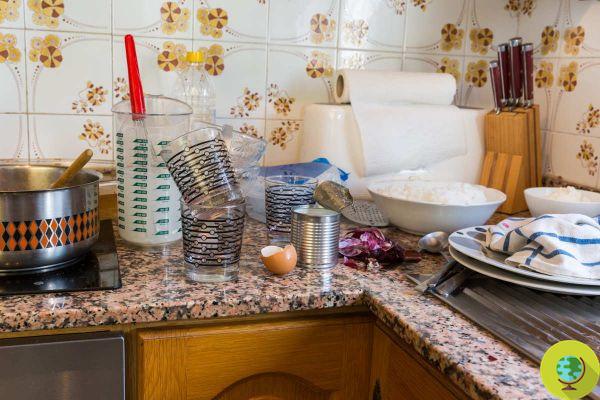 Don't store avocado like this: it's dangerous
Don't store avocado like this: it's dangerous
Do you know about cross contamination? How to avoid one of the main causes of food poisoning at home and in restaurants
Not everyone knows the cross contamination, a major cause of food poisoning, a problem to be careful not only at home, but also in the restaurant, in particular for people suffering from food allergies or celiac disease, as the contamination can also concern gluten and other allergens. (Also Read: This Is The Number 1 Most Surprising Source Of Food Poisoning According To The CDC)
Index
Cross-contamination, what is it?
When we talk about cross-contamination we refer to the situation in which some microorganisms pass from one food to another contaminating it. In most cases, this transmission occurs between raw and cooked foods, although it can also occur through contact with kitchen utensils or work surfaces.
Cross-contamination is divided into two types depending on the type of contact that led to the transfer of bacteria:
- Direct cross-contamination: this type of contamination usually occurs from a contaminated raw food that comes into contact with a cooked food, for example by mixing raw and cooked ingredients in the same dish (see chicken salad).
- Indirect cross contamination: in this case, food contamination occurs through contact with some contaminated surfaces or kitchen utensils. The hands of the person preparing the food can also be a vehicle for contamination if they first touched contaminated food or utensils and were not subsequently washed.
Cross-contamination may not involve microorganisms, but the transfer of allergens from a food that contains them to one that was originally devoid of them.
Cross contamination, celiac disease and food allergies
People with celiac disease must be particularly careful of any cross-contamination. Since they are allergic to gluten, the risk of contamination of this allergen within other foods that, at least in theory, should not contain it can be dangerous to health. The risk is run both by consuming food purchased at the supermarket and not admittedly gluten-free and at home or at the restaurant if you do not take care to use separate surfaces and utensils for the preparation of dishes suitable for celiacs.
The same goes for people allergic to other types of food who must always pay particular attention that traces of allergens do not end up in the foods they will consume.
How to avoid cross-contamination
Here are some good practices that each of us should follow to avoid food contamination:
- Always place cooked foods on the top shelves of the refrigerator and raw foods below
- Always wash your hands after handling food so that they are clean before handling another product
- Do not use a knife that we used to cut a raw food onto any other food, whether raw or cooked and vice versa
- Always wash utensils, knives and other kitchen equipment well
As for the contamination with gluten it is advisable to pay attention to:
- Store all gluten-free foods on a special shelf away from any gluten-containing foods in the house
- If there are foods with gluten and others without gluten in the house, it is good to put the "gluten free" ones on the higher shelves, in this way the risk of traces of allergens falling from top to bottom contaminating the foods suitable for those who suffer of celiac disease.
- Even in the fridge and freezer, gluten-free foods go on high shelves away from foods with gluten
If you suffer from celiac disease and go to eat at a restaurant, rely only on certified and safe places where cross-contamination is avoided by using special spaces and tools for cooking gluten-free dishes.
On food poisoning you might also be interested in:
- Be careful, leftover rice could be very bad for you if you don't store it properly
- Food poisoning: how to protect yourself from foodborne illnesses
- Food poisoning: 8 rules to avoid them in the summer
- All the foods you shouldn't eat during pregnancy to avoid infections and food poisoning


























